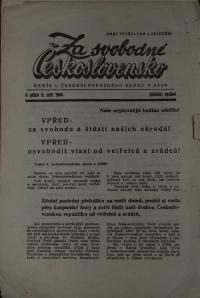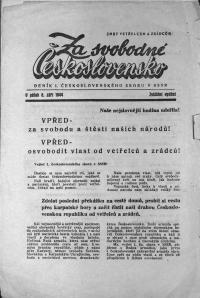Colonel (ret.) Jan Setvák
* 1915 †︎ 2012
-
“I knew that the direction was east, I knew where to fly, I approximately knew where the front line was, direction east, behind Košice. That was easy. The compass was perfect, I had the course, ninety for east, just like that, nothing accurate, I didn’t know any particular place where to go, nothing… I finally got to Poland. This land was already occupied by Russians. But I didn’t realize it, from above! So I flew to an airport. It was called Mielec. That airport was occupied by the Germans, before. They were there before and they left the planes there, German planes. I thought that I lost my way and came to Germany. But it wasn’t so. The airport was occupied by the Soviet Army and Soviet planes. First I thought that I would land there, I gave them signs, the planes were hidden and camouflaged, but there were a lot of cannons and I saw all the soldiers running to the cannons as if they were going to shoot at me, and that’s also what happened. Six fighter planes took off, these were the Jaks, and they wanted to shoot me down because they saw the German plane and they thought I was German. I was dodging the best I could and then I found a place, a suitable place to land. It wasn’t suitable at all! It looked good from above but then … I landed and smashed the plane because there were train tracks in the way. So the plane couldn’t get off again, it was broken. Everybody was all right, but then they came… the fighters were circling around and shooting at us and at the plane. Then the soldiers came, a platoon, and they started shooting at us, they thought we were Germans. And then they captured us.
-
“It was at the beginning [of the war] when we wanted to escape. We had a plan that a whole regiment will fly south from Piešťany to Yugoslavia. Somebody turned us in, five planes escaped to Poland. One of the pilots is still alive, Imro Gablavy, he lives in Havlíčkův Brod. The others have passed away. I remember Imro from the school. ‘So five planes escaped, we were disclosed and caught and put in prison. This is how it ended. So I was in Bratislava in jail. I was lucky because one of the guards was my neighbor from our village! So he brought me things, food, he even brought a book for me to read. [Interviewer:] »And they released you after that?« They had to! Because I was a pilot and they didn’t have any pilots, so they had to set us free!”
-
“The whole Slovak nation was alarmed. It was the uprising. It was everywhere, it couldn’t be concealed. So we thought, the men, that we could fly over with a Focke Wulf, from Trenčín to… it was quite a distance… It wasn’t as easy as they imagined! [Interviewer:] »And how did you plan it? « It was a simple plan. It was summer, it was lunchtime and the pilots were in the canteen, it was quiet, and in the meantime, we took off from the airport. I flew the plane and there were others, technicians, a guy named Bartoš… It was hard, I had no experience with that plane but I decided to fly it anyway. [Interviewer:] »And what kind of a plane was that?« A two engine Focke Wulf, it was enormously big! And I never flew with that. So I asked a friend who had entrance to the plane. Any other access to that plane was forbidden. But he was a mechanic, he went in there quite often so he was spying, checking the dashboard and I kept on asking him: ‘Gejza, so what? Did you check on everything?’ And he said: ‘Yes, I know everything.’ He knew nothing! We took off and I was telling him ‘Gejza, pull in the gear!’ And he asked: ‘Where is it? How can I pull it in? I don’t know,’ waving his arms up in the air.
-
“I asked Brezhnev not to shoot at the Slovak planes. ‘Because,’ I told him, ‘there will be a large group of Slovak planes deserting to your side.’ [Interviewer:] »And he believed you?« Yes, and he arranged everything for that! I asked him and I also have it written from Bartoš, he wrote: ‘Janko, if you hadn’t helped it, it would have ended up bad. They would have shot all the Slovak planes down!’ Nobody would have escaped. But I arranged it so. We haven’t met eye to eye, but I arranged… The colonel and the head of the airport from where the planes took off came to me and they told me: ‘Slušaj, ljotčik, vašich počti peděsiať štuk vašich samoljotov’ – Fifty Slovak planes flew over to our side – And I asked him: ‘A skolko vy jich sbili?’ – How many of them did you put down? – And he said: ‘Ni odnovo!’ – ‘Not a single one. – everything is all right.’ And I said: ‘So congratulations to your air forces.’ It wasn’t a trifle! There were fifty planes, that were one hundred people! They would have killed them all. The Soviets would have shot them down, imagine that! And I in fact arranged that the guys are still live, many of them until now.”
-
“Then we had a banquet in that room. I was there, the colonel was there and some generals. And the colonel told me – he saw my ring, an ordinary ring that the mechanics made out of duralumin. And it had something engraved on it (that’s interesting you can put it there) … And the colonel sits and talks to me ‘Slušaj, ljotčik, pokaži kalco!’ Show me the kalco … So I give him the kalco. And he studies it … ‘Anapa!’ And asks me: ‘You fought at Anapa!’ ‘Yes I did.’ ‘And you flew a Messerschmitt! And how many our planes have you got down?’ Oh my God… This was a man that could have any of us fest against the wall! And I said: ‘Not a single one did I shot down.’ ‘Eto nevazmóžno!’ – ‘No way. Not a single one. And he flew a Messer. How come…?’ ‘I always escaped. They were shooting at me and I escaped.’”
-
Celé nahrávky
-
Brno, 08.07.2003
(audio)
délka: 01:01:07
Celé nahrávky jsou k dispozici pouze pro přihlášené uživatele.
“I asked Brezhnev not to shoot at the Slovak planes. ‘Because,’ I told him, ‘there will be a large group of Slovak planes deserting to your side.’”
Jan Setvák was born in 1915 in Bošáca, Slovakia. After He had finished the basic school in Mové mesto nad Váhom he was enrolled at a flight school in Prostějov. He graduated successfully and then he served in the Czechoslovak Army and later in the Slovak Army as a fighter pilot. He fought at the Eastern Front in the Caucasus area. He did not agree with the strategic aims of the Slovak Army from the very beginning but didn‘t manage to desert to the other side until the Slovak National Uprising. He was trained at Soviet planes and he fought under the Czechoslovak squadron in the air battles over North Moravia. After the war, he became a painter. Jan Setvák died on September 25, 2012.

